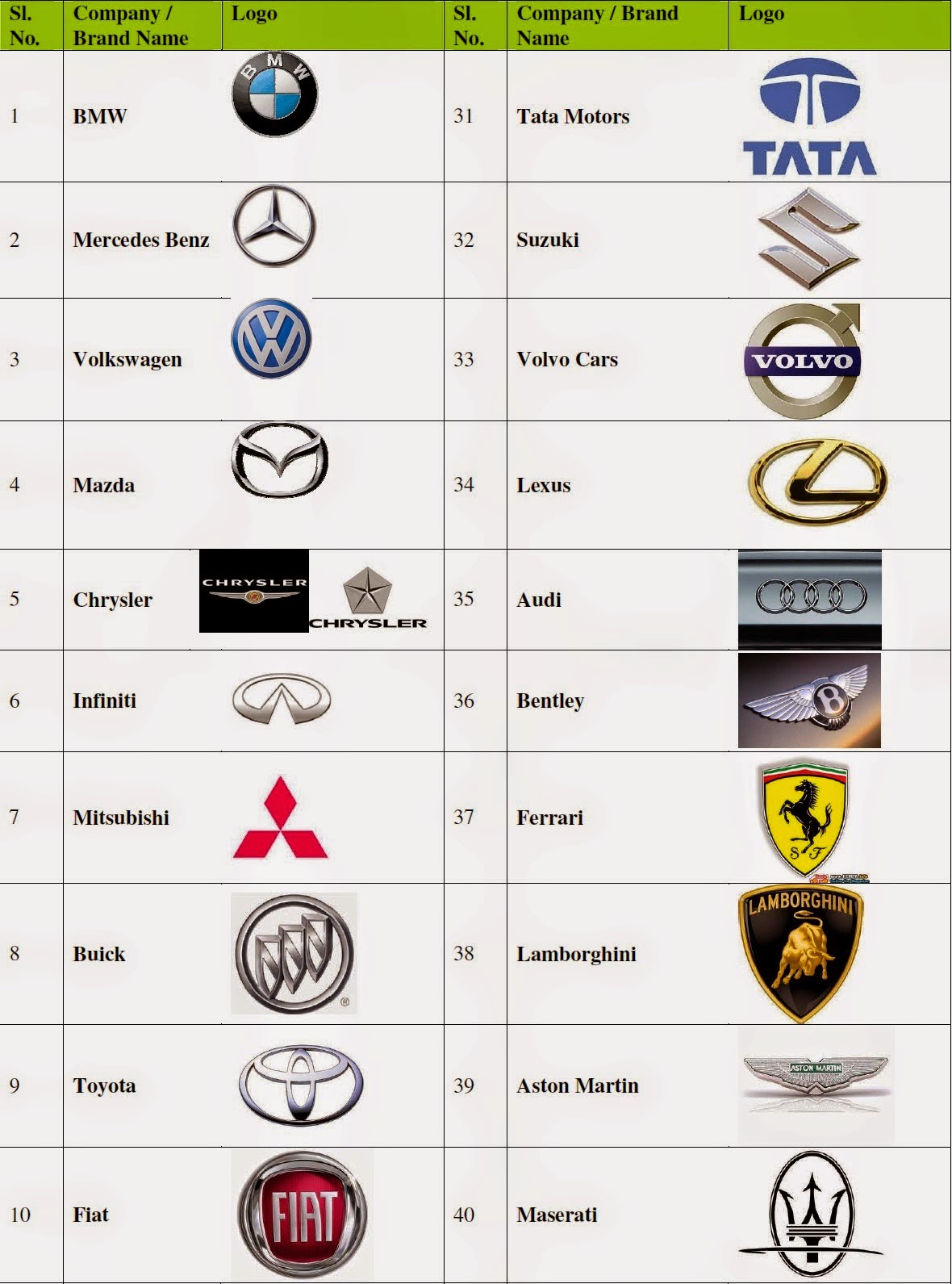The Best Car Brands: Navigating Automotive Excellence
The Best Car Brands: Navigating Automotive Excellence cars.truckstrend.com
Introduction: Defining Automotive Excellence
The phrase "the best car brands" often conjures images of opulent luxury vehicles or high-performance sports cars. However, in the vast and competitive automotive landscape, "best" is a deeply multifaceted and highly subjective concept. It’s not merely about the most expensive badge or the fastest engine. True automotive excellence encompasses a delicate balance of reliability, safety, innovation, performance, value, and customer satisfaction, all tailored to meet diverse consumer needs. Understanding what makes a car brand "best" for you is crucial in making an informed purchasing decision that aligns with your lifestyle, budget, and priorities. This comprehensive guide will delve into the various facets of automotive excellence, highlighting the brands that consistently stand out across different categories and offering practical advice to help you navigate the journey of finding your ideal vehicle.
The Best Car Brands: Navigating Automotive Excellence
Defining "Best": More Than Just Luxury
Before we dive into specific brands, it’s essential to unpack what constitutes "best" in the automotive world. A truly great car brand excels in multiple areas, not just one.
- Reliability & Durability: A car that consistently starts, runs without major issues, and lasts for many years with minimal unexpected repairs is invaluable. Brands known for their longevity and low cost of ownership often top reliability charts.
- Safety: Protecting occupants is paramount. Brands that invest heavily in advanced safety features, robust construction, and consistently achieve high crash test ratings are leaders in this regard.
- Performance & Driving Dynamics: This isn’t just about raw speed. It encompasses responsive handling, smooth power delivery, comfortable ride quality, and an engaging driving experience, whether for daily commuting or spirited adventures.
- Innovation & Technology: From advanced infotainment systems and connectivity features to cutting-edge autonomous driving aids and revolutionary electric powertrains, innovative brands push the boundaries of what a car can do.
- Value & Ownership Costs: This includes the initial purchase price, fuel efficiency, insurance costs, maintenance expenses, and perhaps most importantly, resale value. A "best" brand often retains its value well over time.
- Customer Satisfaction & Brand Reputation: Beyond the product itself, how a brand treats its customers, the quality of its dealer network, and its overall public perception significantly contribute to its "best" status.
- Design & Aesthetics: While subjective, a brand’s consistent design language and ability to create visually appealing vehicles contribute to its overall desirability and market appeal.

The Pillars of Automotive Excellence: Top Contenders Across Categories
Different brands specialize in different areas, appealing to various consumer segments. Here’s a look at some of the leading contenders across key categories:

Luxury & Prestige: Craftsmanship, Comfort, and Cutting-Edge Tech
Brands in this category offer premium materials, sophisticated designs, advanced technology, and often superior comfort and performance. They are synonymous with status and a refined driving experience.
- Mercedes-Benz: Renowned for its blend of luxury, comfort, and advanced technology. Mercedes vehicles offer exquisite interiors, powerful engines, and a strong emphasis on safety and innovation, particularly with its MBUX infotainment system and extensive driver-assistance features.
- BMW: The epitome of "the ultimate driving machine." BMW excels in performance, handling, and driver engagement. Their vehicles combine sporty dynamics with luxurious appointments and state-of-the-art technology.
- Audi: Known for its sophisticated design, impeccable interior quality, and quattro all-wheel-drive system. Audi offers a harmonious blend of luxury, technology, and performance, often with a more understated elegance than its German rivals.
- Lexus: Toyota’s luxury arm, Lexus is celebrated for its unparalleled reliability, serene comfort, and exceptional build quality. Their vehicles offer a plush ride, refined powertrains, and a strong focus on customer service.
- Porsche: While often associated with sports cars, Porsche’s expansion into SUVs (Macan, Cayenne) and sedans (Panamera, Taycan) has brought its engineering prowess and performance pedigree to a broader audience, all while maintaining its distinctive driving feel.

Reliability & Value: Durability, Low Cost of Ownership, and Practicality
These brands consistently top reliability surveys, offer excellent fuel economy, and provide strong resale value, making them smart long-term investments.
- Toyota: A global benchmark for reliability, durability, and strong resale value. Toyota’s lineup, from the Corolla to the RAV4 and Tacoma, consistently delivers dependable transportation with low maintenance costs.
- Honda: Similar to Toyota, Honda is praised for its engineering excellence, fuel efficiency, and long-term reliability. Its engines are legendary, and models like the Civic, CR-V, and Accord are perennial best-sellers.
- Mazda: Often praised for its "premium for the people" approach, Mazda offers vehicles with engaging driving dynamics, upscale interiors, and impressive reliability, often at a more accessible price point than traditional luxury brands.
- Subaru: Known for its standard Symmetrical All-Wheel Drive, impressive safety ratings, and rugged capability. Subaru vehicles are popular among outdoor enthusiasts and families seeking all-weather confidence and dependability.
- Hyundai & Kia: These South Korean brands have made incredible strides in recent years, offering stylish designs, generous features, competitive warranties, and significantly improved reliability and quality. They provide excellent value for money across their diverse lineups.
Performance & Driving Dynamics: Adrenaline and Precision
For those who prioritize an exhilarating driving experience, these brands consistently deliver.
- Porsche: Still the gold standard for sports cars, offering sublime handling, powerful engines, and iconic designs.
- BMW M / Mercedes-AMG: The performance divisions of their respective luxury brands, delivering highly tuned engines, sport-tuned suspensions, and aggressive styling for track-ready performance in a road-legal package.
- Ford (Mustang, GT): America’s iconic muscle car, the Mustang, offers thrilling performance and unmistakable style. The limited-production Ford GT supercar showcases the brand’s engineering prowess.
- Chevrolet (Corvette): An American legend, the Corvette has evolved into a world-class mid-engine sports car offering incredible performance and value.
Innovation & Technology: Pioneering the Future
These brands are at the forefront of developing new technologies, particularly in electric vehicles (EVs) and autonomous driving.
- Tesla: The undisputed leader in electric vehicle adoption, known for its long-range batteries, powerful performance, extensive Supercharger network, and over-the-air software updates that continuously improve its vehicles.
- Mercedes-Benz / Audi / BMW: These luxury brands are heavily investing in electrification (EQ, e-tron, i sub-brands) and advanced driver-assistance systems, integrating cutting-edge tech into their premium offerings.
- Hyundai / Kia: Surprisingly, these brands are also strong contenders in the EV space, with popular and highly-rated models like the Hyundai Ioniq 5 and Kia EV6 pushing boundaries in design, range, and charging speed.
Utility & Versatility: Trucks, SUVs, and Family Haulers
For those needing robust capability, ample cargo space, or off-road prowess, these brands excel.
- Ford: A dominant force in the truck market with the best-selling F-Series, and a strong SUV lineup (Explorer, Bronco, Expedition).
- Ram: Known for its comfortable and capable pickup trucks, often praised for their luxurious interiors and innovative features.
- Chevrolet: Offers a comprehensive range of trucks (Silverado) and SUVs (Tahoe, Suburban, Traverse) known for their ruggedness and towing capacity.
- Jeep: The quintessential off-road brand, offering iconic vehicles like the Wrangler and capable SUVs like the Grand Cherokee.
- Toyota: Beyond cars, Toyota’s Tundra, Tacoma, 4Runner, and Highlander are celebrated for their legendary reliability and off-road capabilities.
How to Choose the "Best" Car Brand for YOU: Practical Advice
Given the diverse strengths of different brands, finding your "best" requires a systematic approach:
- Identify Your Needs & Priorities:
- Budget: What’s your realistic purchase price range, including insurance and running costs?
- Lifestyle: Do you commute daily, carpool, go off-roading, or need space for hobbies?
- Features: What are your must-haves (AWD, specific safety tech, infotainment)?
- Driving Style: Do you prefer comfort, sportiness, or a balance?
- Research Reliability & Safety Ratings: Consult independent organizations like J.D. Power, Consumer Reports, and the Insurance Institute for Highway Safety (IIHS) or National Highway Traffic Safety Administration (NHTSA).
- Consider Resale Value & Ownership Costs: Look into predicted depreciation, typical maintenance schedules, and fuel economy.
- Test Drive Thoroughly: Never buy a car without an extended test drive. Pay attention to comfort, visibility, handling, acceleration, and how all the controls feel.
- Read Reviews & Expert Opinions: Cross-reference professional reviews with owner testimonials to get a balanced perspective.
- Assess After-Sales Service & Warranty: A great brand backs its products with a solid warranty and has a reputable dealer network for service and support.
- Think Long-Term: How long do you plan to keep the car? How might your needs change?
Beyond the Badge: What Else Matters?
While brand reputation is a strong indicator, remember that individual models within a brand can vary. Also consider:
- Dealership Experience: A good local dealership can make or break your ownership experience, regardless of the brand.
- Environmental Impact: Many brands are pushing towards electrification and sustainable manufacturing. If this is important to you, research their commitments.
- Future Trends: The automotive industry is rapidly evolving. Consider a brand’s vision for the future (e.g., commitment to EVs, autonomous tech) if you plan to keep the car for many years.
Challenges and Considerations
- Brand Loyalty vs. Open-mindedness: Don’t let past experiences or brand perception limit your choices. New players and established brands are constantly evolving.
- Rapid Technological Change: Features that are cutting-edge today might be standard tomorrow. Focus on core reliability and features that truly matter to you.
- Supply Chain Issues: Global events can impact vehicle availability and lead times. Be prepared for potential delays or limited options.
Practical Advice and Actionable Insights
To effectively choose from the "best" car brands, approach it like an investment. Define your personal "best" criteria, then systematically evaluate brands and specific models against those criteria. Leverage online resources, visit multiple dealerships, and most importantly, trust your instincts after thorough test drives. Don’t be swayed solely by marketing; focus on how the vehicle genuinely fits your life and offers long-term value.
Concluding Summary
Ultimately, "the best car brand" is not a universal title but a personal one. While brands like Toyota, Honda, Mercedes-Benz, BMW, and Tesla consistently rank high in various objective measures, your ideal choice depends on your unique needs, priorities, and budget. By understanding the diverse strengths of leading brands across categories like reliability, luxury, performance, and innovation, and by employing a strategic approach to research and test driving, you can confidently navigate the automotive market and find the vehicle that truly is "best" for you, offering years of satisfaction and dependable service.
Price Table: Representative Starting MSRPs for Popular Models from "Best" Car Brands
Disclaimer: Prices are approximate Starting Manufacturer’s Suggested Retail Prices (MSRPs) for entry-level models within each brand’s popular lineup. Actual prices vary significantly based on model, trim level, optional features, region, dealer markups, incentives, and market conditions. This table is intended for general guidance only.
| Car Brand | Known For | Representative Popular Models | Typical Starting MSRP Range (USD) |
|---|---|---|---|
| Toyota | Unmatched Reliability, Resale Value, Practicality | Corolla, RAV4, Camry, Tacoma | $22,000 – $30,000 (Cars/Small SUVs) $30,000 – $45,000+ (Trucks/Larger SUVs) |
| Honda | Reliability, Fuel Efficiency, Engineering Excellence | Civic, CR-V, Accord, Pilot | $24,000 – $30,000 (Cars/Small SUVs) $30,000 – $45,000+ (Larger SUVs) |
| Mazda | Driving Dynamics, Upscale Interiors, Value | Mazda3, CX-5, CX-30 | $24,000 – $35,000 |
| Subaru | AWD, Safety, Outdoor Capability | Impreza, Forester, Outback, Crosstrek | $24,000 – $35,000 |
| Hyundai | Value, Warranty, Style, Innovation | Elantra, Kona, Tucson, Ioniq 5 | $22,000 – $38,000 (ICE) $40,000 – $55,000+ (EVs) |
| Kia | Value, Warranty, Style, EV Leadership | Forte, Seltos, Sportage, EV6 | $21,000 – $38,000 (ICE) $42,000 – $58,000+ (EVs) |
| Mercedes-Benz | Luxury, Technology, Comfort, Prestige | C-Class, GLC, CLA, EQB | $45,000 – $65,000+ (Entry/Mid-range) $70,000 – $100,000+ (Luxury/Performance) |
| BMW | Driving Dynamics, Performance, Luxury | 3 Series, X3, 2 Series, 4 Series | $43,000 – $65,000+ (Entry/Mid-range) $70,000 – $100,000+ (Luxury/Performance) |
| Audi | Sophistication, Design, Quattro AWD | A3, Q3, Q5, A4 | $38,000 – $60,000+ (Entry/Mid-range) $65,000 – $90,000+ (Luxury/Performance) |
| Lexus | Reliability, Comfort, Refinement, Customer Service | ES, RX, NX, IS | $42,000 – $60,000+ |
| Porsche | Performance, Sports Car Heritage, Luxury | Macan, Cayenne, 718 Cayman/Boxster, Taycan | $60,000 – $90,000+ (Entry SUVs/Sports Cars) $100,000 – $200,000+ (High-end) |
| Tesla | Electric Vehicle Innovation, Performance | Model 3, Model Y, Model S, Model X | $40,000 – $60,000+ (Model 3/Y) $80,000 – $100,000+ (Model S/X) |
| Ford | Trucks, SUVs, Performance | F-150, Explorer, Bronco, Mustang | $35,000 – $55,000+ (Trucks/SUVs) $30,000 – $60,000+ (Cars/Performance) |
| Ram | Trucks, Comfort, Capability | 1500, 2500 | $38,000 – $60,000+ |
| Chevrolet | Trucks, SUVs, Value, Performance | Silverado, Equinox, Traverse, Corvette | $28,000 – $50,000+ (SUVs/Cars) $38,000 – $60,000+ (Trucks) |
| Jeep | Off-Road Capability, SUV Lineup | Wrangler, Cherokee, Grand Cherokee, Gladiator | $32,000 – $55,000+ |
Frequently Asked Questions (FAQ) about The Best Car Brands
Q1: What does "best" truly mean when talking about car brands?
A1: "Best" is subjective and depends on your priorities. It can refer to reliability, safety, performance, luxury, value for money, innovation, or a combination of these factors. There isn’t one single "best" brand for everyone.
Q2: Which car brands are known for the best reliability?
A2: Brands like Toyota, Honda, Lexus (Toyota’s luxury division), and Mazda consistently rank highly in reliability studies by organizations like J.D. Power and Consumer Reports. Hyundai and Kia have also significantly improved their reliability in recent years.
Q3: Are luxury car brands always the "best"?
A3: Not necessarily for everyone. While luxury brands like Mercedes-Benz, BMW, and Audi offer premium features, performance, and prestige, they typically come with higher purchase prices, maintenance costs, and often lower fuel efficiency compared to mainstream brands. Their "best" status is often tied to luxury and performance, not necessarily overall value or long-term reliability.
Q4: Which brands are leading in electric vehicle (EV) technology?
A4: Tesla is widely recognized as a pioneer and leader in the EV market, known for its range, performance, and charging infrastructure. Traditional luxury brands like Mercedes-Benz, Audi, and BMW are rapidly expanding their EV lineups, and mainstream brands like Hyundai and Kia are also making significant strides with popular and innovative EV models.
Q5: How important is resale value when choosing a car brand?
A5: Resale value is very important if you plan to sell or trade in your car within a few years. Brands known for strong reliability and demand (e.g., Toyota, Honda, Subaru, Lexus) tend to retain more of their value, saving you money in the long run.
Q6: Should I stick to a brand I’ve owned before?
A6: While brand loyalty can be comforting, it’s wise to keep an open mind. The automotive industry evolves rapidly, and brands constantly introduce new models and technologies. Researching other brands might lead you to a vehicle that better suits your current needs and budget.
Q7: Where can I find objective information to compare car brands?
A7: Reputable sources include:
- Consumer Reports: For reliability, owner satisfaction, and road tests.
- J.D. Power: For initial quality, dependability, and customer satisfaction surveys.
- IIHS (Insurance Institute for Highway Safety) & NHTSA (National Highway Traffic Safety Administration): For safety ratings and crash test results.
- Edmunds, Kelley Blue Book (KBB), Car and Driver, MotorTrend: For expert reviews, pricing information, and comparisons.





